Currency
The Turkish lira’s dramatic slump has added fuel to a surge in cryptocurrency trading in the country, data showed, with investors hoping to both gain from bitcoin’s rally and shelter against inflation.
Turkey’s currency has lost over 13% since President Tayyip Erdogan fired central bank Governor Naci Agbal earlier this month, stoking fears of looser policy and rising price pressures that could erode the lira’s value.
The aftermath of the Agbal’s sacking accelerated an already growing boom in Turkey’s crypto market.
Trading volumes between the start of February and March 24 hit 218 billion lira ($26 billion) with a spike on the weekend of Agbal’s ouster, data from US researcher Chainalysis shared with Reuters showed, surging from a little over 7 billion lira in the same period a year earlier.
The jump echoes soaring global interest in crypto, driven by bitcoin’s rally to a record of just under $62,000 as major investors and companies embraced the emerging asset.
Yet investors in Turkey said a weaker lira and inflation pressures, as well as hopes of quick gains, have driven demand.
Taiwan Semiconductor Manufacturing Co plans to spend US$100 billion over the next three years to expand its chip fabrication capacity, a staggering financial commitment to address booming demand for new technologies.
TSMC, the world’s leading manufacturer of advanced semiconductors, already planned a record capital expenditure of as much as US$28 billion this year, but recent trends and developments have pushed for even more capacity. Now at the centre of a global chip supply crunch, Taiwan’s biggest company has pledged to work with customers across industries to overcome a deluge of demand.
“TSMC expects to invest US$100 billion over the next three years to increase capacity to support the manufacturing and [research and development] of advanced semiconductor technologies,” the company said in a statement responding to local media reports. “TSMC is working closely with our customers to address their needs in a sustainable manner.”
TSMC suppliers surged on the news, buoyed in part also by Micron Technology Inc’s bullish forecast. Screen Holdings Co climbed 6 per cent, Tokyo Electron Ltd rose 4.7 per cent and ASM International NV jumped as much as 5.4 per cent while ASML Holding NV was as much as 3.2 per cent higher on Thursday. TSMC’s own share price was up 2.6 per cent on the day.
(CNN)It’s been a great time to be selling really, really expensive cars.
Volkswagen could end up in hot water over its ‘Voltswagen’ marketing stunt
New York (CNN Business)Volkswagen of America says its “Voltswagen” name change was merely a joke “in the spirit of April Fools’ Day” to promote a new electric car. But even if it was meant as a lighthearted marketing gag, the move could land the carmaker in some serious trouble.
In October 2018, Visa Inc. CEO Aflred Kelly told CNBC’s Jim Cramer that cryptocurrencies are not a big threat but “if we have to go there, we will go there.”
At the time, Visa was a $300B+ company and the combined market cap of all cryptocurrencies was $200B+. Today, things are looking different:
- Visa = $450B+
- Crypto (primarily Bitcoin/Ethereum) = $1.8T+
Well, earlier this week… Visa went there. Per Reuters, the payments giant will roll out a pilot program with crypto platform Crypto.com.
How it works
Crypto.com already offers its users a Visa card. However, any payments used by the cryptocurrency card have to be converted to fiat, which adds costs and complexities for merchants.
Here’s the new process:
- A Crypto.com Visa card purchase is made
- Instead of converting to fiat, Visa will settle the transaction using Crypto.com’s USDC stablecoin, which is pegged to the US dollar (to limit volatility)
- It will all be done on the Ethereum blockchain
This should reduce the friction in using crypto for payments
Ethereum has its own fee — called gas costs — to operate on the blockchain.
According to Protocol, a single transaction could rack up a fee of $10 to $20. Visa’s solution: to bundle payments as it does on its existing network to reduce costs and increase speed.
Such an improved process will go a long way to mainstreaming crypto for everyday payments.
The cryptocurrency momentum is undeniable
As Bitcoin continues to rise, other big finance names are jumping aboard the crypto train. Among the moves:
- PayPal will offer a checkout service that turns crypto assets into fiat to pay for goods across 29m merchants on its network
- Fidelity plans to launch a bitcoin exchange-traded fund (ETF)
- Goldman Sachs is on the verge of offering bitcoin and crypto services to its wealth management clients
JPMorgan Chase, BNY Mellon, BlackRock, and Mastercard are all making their own moves in tandem.
It’s safe to expect more finance players to “go there” in the very near future.













